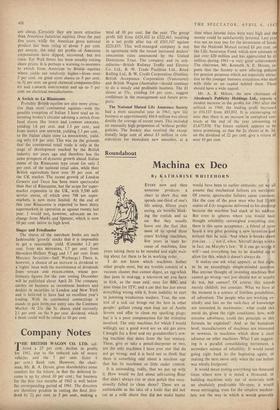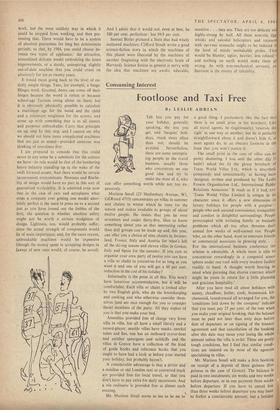Roundabout
Machina ex Deo
By K ATHAR1NE WHITEHORN I do not know which machines bother other people most, but my trouble consists of a vacuum cleaner that cannot digest, an egg-whisk that jams in mid-egg, a television set you have to kick, as the man said, once for BBC and nine times for 1TV; and a car that has just about everything wrong with it, from inability to start to jamming windscreen washers. True, the con- trol of a sick car brings out the best in other people: gallant young men leap out of Austin Sevens and offer to clean my sparking plugs; but it is a poor compensation for the irritation involved. The only machines for which I would willingly say a good word are an old gas stove I bought for a fiver and my grandmother's sew- ing machine that dates from the last century. These, give or take a pencil-sharpener or two, are the only machines I have ever met that do not go wrong; and it is hard not to think that there' is something odd about a machine age that has its machines so little under control.
It is astounding, really, that we put up with it. How would we feel about self-raising flour that didn't always rise or shoe polish that occa- sionally failed to clean shoes? These are as unthinkable as the idea of a knife that did not cut or a milk churn that did not make butter
would have been to earlier centuries; yet we all assume that mechanical failures are inevitable. Of course, spectacular failures cause comment, like the case of the poor man who had 35,,000 copies of Life magazine delivered to his dootstep because the machine had stuck at his addi-ess. But even in spheres where you would have thought reliability outweighed everything else, there is this same acceptance: a friend of mine heard a test pilot praising a new invention and noticed that he said, `And when it breaks down you can . . .,' not if, when. Aircraft design works, in fact, on Murphy's law: `If it can go wrong it will'—and everything has to be doubled up, to allow for this, which it doesn't always do.
It makes one ask what appears, at first sight, to be an exceedingly simple-minded question. Has anyone thought of inventing machines that cannot go wrong—not just should not or usually do not, but cannot? Of course, this sounds merely childish; but consider. What we have at the moment is a science of limitless possibilities, of adventure. The people who are working ex- citedly and fast on the rock-face of knowledge are interested in maximums: what could this metal do, given the right conditions; how, with extreme adroitness, could this principle or this formula be exploited? And, at the humdrum level, manufacturers of machines are interested in newness, in machines which show a clear advance on other machines. What I am suggest- ing is a parallel consolidating movement, a secondary science of reliability. It would mean going right back to the beginning again; or making the next move only when the one before was wholly foolproof.
It would mean testing everything ten thousand times where now it is tested a thousand; or building machines only out of materials with an absolutely predictable life-span; it would mean envisaging, even for the simplest mechan- ism, not the way in which it would generally
work, but the most unlikely way in which it could be stopped from working, and then pre- venting that. There would have to be a system of absolute guarantees for long but determinate periods; so that, by 1984, you could choose be- tween two types of appliance: the attractive, streamlined delicate model embodying the latest improvements, or a sturdy, uninspiring, slightly out-of-date machine that you could count on absolutely for ten or twenty years.
It would mean going back to the level of en- tirely simple things. Take, for example, a hinge. Hinges work. Granted, doors can come off their hinges because the wood is rotten or because school-age Tarzans swing about on them; but it is obviously physically possible to calculate a maximum age for the wood and the child and a minimum toughness for the screws, and come up with something that is to all intents 'and purposes unbreakable. Carry that principle on up, step by tiny step, and I cannot see why we should not have more complicated machines that are just as sound—provided someone was thinking of soundness first.
I am prepared to concede that this could never in any sense be a substitute for the science we have—its role would be that of the lumbering heavy infantry trundling up in the wake of the swift forward scouts. And there would be certain inconvenient concomitants. Newness and flexibi- lity of design would have no part in this sort of guaranteed workability. It is admitted even now that in the case of cars and aeroplanes what stops a company ever getting one model abso- lutely perfect is the need to press on to a second just as you have ironed out the foibles of the first; the question is whether absolute safety might not be worth a certain stodginess of design. Lightness, too, would probably suffer, since the actual strength of components would be of main importance; and, for the same reason, unbreakable machines would be expensive (though the money spent in scrapping designs in favour of new ones would, of course, be saved). And I admit that it would not, even at best, be 100 per cent. perfection: but 99.9 per cent.
Samuel Butler pictured a State that had wisely outlawed machines; Clifford Simak wrote a good science-fiction story in which the machines of this planet were liberated by the machines of another (beginning with the electronic brain of Harvard). Science fiction in general is nervy with the idea that machines are awake, educable, sensitive . . . they are. They are too delicate an highly-strung by half. All these neurotic egE whisks and suicidal helicopters and vacuum with nervous stomachs ought to be reduced t the level of sturdy unshakable proles. The would be blunter, uglier, heavier, less refined- and nothing on earth would make them g wrong. As with non-mechanical servants, IC finement is the enemy of reliability.
0



































 Previous page
Previous page